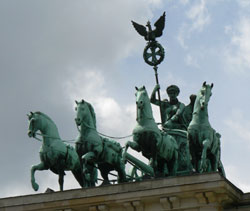 Secret quasi-legal government spying, Episode III
Secret quasi-legal government spying, Episode III
For the third time in six months a newspaper has broken a story of secret, barely-or-not-legal spying on the American people by its government. And again the administration has responded by chastising the press for telling the truth:
Referring to the disclosure by The New York Times last December of the National Security Agency’s eavesdropping program, she said, “The president is concerned that once again The New York Times has chosen to expose a classified program that is working to protect our citizens.”

No matter how scared of terrorists you were feeling this morning, it’s hard to buy into the pouty “now they know, you’ve ruined it” argument. It presupposes that the program is itself unconstitutional (yes, their own argument) and further that terrorist killers know what’s constitutional and what isn’t. Finally, it requires that terrorists expect the Bush administration to obey the U.S. constitution. Okay. They may be crazed fundamentalists, but they aren’t that stupid.
Of course there is a more realistic way that the Times’s tattling could help terrorist killers. Theoretically, with this thing called “the balance of power” that was dreamed up by dope-smoking liberals in the 1960s, the courts could shut down the program. Then we might miss a clue to the next big attack.
Wouldn’t it be refreshing if the administration gave us their straight argument? We’re sorry we kept this a secret, but we felt the needs were too pressing to subject the program to judicial review. We will now make our case for it to continue under the laws of the United States.
This is the kind of truthfulness you only find in fictional presidents. But it’s getting very hard to trust anyone’s word in the Bush administration (or even listen to them talking), as one little obvious white lie piles up on top of a hundred others, each repeated incessantly by loyalists in every forum. Bummer.
The right thing for the Bush administration to do now is to disclose whatever other eyebrow-rasing programs they’ve instituted in secret. It would also be the smart thing to do—the past six months have shown that these programs will not stay secret forever.
In the terror after Sept. 11th, we all became permissive towards the government. We knew the administration would respond to the attacks with questionable tactics, but our emotional state directed us to look the other way.
This is no longer the case; we’re starting to remember the importance of limited government power. Everyone is, including the people who know the secrets. From AT&T employees to international bankers, people are questioning the questionable.
Maybe some or all programs should be kept. This is the sort of thing that’s decided by the people, in what we call a democracy. (It’s no wonder we’re having trouble imparting that concept to the Iraqis.) But we have to know about the spying programs to decide if we want them in our lives. This is how it works guys, and if you still think otherwise, well, it’s going to be a long end-of-term for all of us.
So, Bush. What’s it gonna be? You tell us, or they tell us?

Add a comment